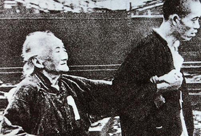 Martenitsa adds glamour to Bulgarian Embassy
Martenitsa adds glamour to Bulgarian Embassy
 Mysterious 'Dolan Tribe' in Xinjiang
Mysterious 'Dolan Tribe' in Xinjiang
 This is Shanghai
This is Shanghai
 Female attendants serving 'two sessions'
Female attendants serving 'two sessions'
 The many tears of DiCaprio
The many tears of DiCaprio
 Dan Dan's bittersweet opera life
Dan Dan's bittersweet opera life
 A dream wedding for a girl suffering from cancer
A dream wedding for a girl suffering from cancer
 Old photos of Anti-Japanese War (1937-1945)
Old photos of Anti-Japanese War (1937-1945)
 This is Beijing – Nanluoguxiang
This is Beijing – Nanluoguxiang
BEIJING, March 8 -- China pledged on Saturday to defend "each inch" of its territory and ruled out any possibilities of compromise on history and territory issues with Japan.
"On the two issues of principle, history and territory, there is no room for compromise," Foreign Minister Wang Yi told a press conference on the sidelines of the annual session of the National People's Congress, China's top legislature, responding to a question about China-Japan relations.
The minister's remarks highlight the mounting tension between China and Japan over the territorial and historical rows. Relations between the two East Asian neighbors have reached a new low since Japan's "purchase" of the Diaoyu Islands in September 2012 despite China's protests.
The Japanese Prime Minister Shinzo Abe's visit at the end of last year to the Yasukuni Shrine, where Japan's war dead, including convicted Class-A war criminals, are honored was also slammed by China and other countries.
Wang said that if some people in Japan insist on overturning the history of its past aggression, the international community and all peace-loving people in the world will not tolerate or condone that.
"2014 is not 1914, still less 1894," said the minister, responding to the parallel some have drawn between the current China-Japan relations and the Germany-Britain relations before the First World War.
"I want to emphasize that instead of using Germany before the First World War as an object lesson, why not use Germany after the Second World War as a role model?" he added.
In 1894, Japan waged the First Sino-Japanese War where China was defeated.
China and Japan normalized the diplomatic relations in 1972 after reaching important common understanding and consensus on properly handling issues including history, Taiwan, and the Diaoyu Islands.
They are the precondition for the normalization of the diplomatic relations and the basis for a return to friendly relations, Wang said.
"The recent comments and actions of the Japanese leader betrayed the spirit of 1972 and undermined the foundation of China-Japan relations. The Chinese people cannot and will not accept it," he added.
On Wednesday, Premier Li Keqiang pledged to safeguard the victory of the Second World War and the post-war international order.
"We will not allow anyone to reverse the course of history," Li told the country's lawmakers at the opening of China's legislative session.
China, one of the major founders of the post-war international order, set two new national days last month, to mark victory in the anti-Japanese war and to commemorate the 300,000-plus Nanjing Massacre victims and all those killed in the Japanese aggression against China during the Second World War.
"The current situation is not something we want to see and is not in the interest of the people in either country," Wang told the Saturday press conference.
"Only by making a clean break with the past and stop going back on one's own words, can the relationship emerge from the current impasse and have a future," the minister added.
"Only by truly committing to a peaceful path and stop saying something but doing something else, can a country gain the trust of its neighbors and the world," Wang said, adding that he hopes the Japanese leader can understand these basic points and respect the bottom line of human conscience and international justice.
In response to a separate question regarding China's neighborhood diplomacy policy, Wang said his country is determined to defend "every inch" of its territory.
"We will never bully smaller countries, yet we will not accept unreasonable denounce from smaller countries," he said, adding that the general situation in China's neighborhood remains "stable and positive."
He said that China would like to carry out equal-footed consultation and negotiation, and properly handle its territorial and maritime disputes with some countries by peaceful means on the basis of historical facts and the international law.
"When others respect us, we respect them even more," Wang told the reporters.
 Chaihe village, pure and peaceful fairyland in snow
Chaihe village, pure and peaceful fairyland in snow Belgians warmly welcome arrival of China's giant pandas
Belgians warmly welcome arrival of China's giant pandas Female marines receive tactical training in NW China
Female marines receive tactical training in NW China Blood memory: Nanjing Massacre in 1937
Blood memory: Nanjing Massacre in 1937 Top 10 pure beauties in showbiz
Top 10 pure beauties in showbiz British WWII veteran: I can't forgive Japan
British WWII veteran: I can't forgive Japan Tongban's dream of prosperity
Tongban's dream of prosperity Chinese frigate Yancheng holds drills in Mediterranean Sea
Chinese frigate Yancheng holds drills in Mediterranean Sea A visit to comfort woman's home in South Korea
A visit to comfort woman's home in South Korea Fairyland? Qingdao in sea of clouds
Fairyland? Qingdao in sea of clouds Top 10 most handsome faces in Asia in 2013
Top 10 most handsome faces in Asia in 2013 Female celebs with beautiful long legs
Female celebs with beautiful long legs Cat 'guardians' in Forbidden City
Cat 'guardians' in Forbidden City Large numbers of ancient coins excavated in Inner Mongolia
Large numbers of ancient coins excavated in Inner Mongolia Leisurely life beneath Zhonggulou, where time travels slower
Leisurely life beneath Zhonggulou, where time travels slowerDay|Week|Month